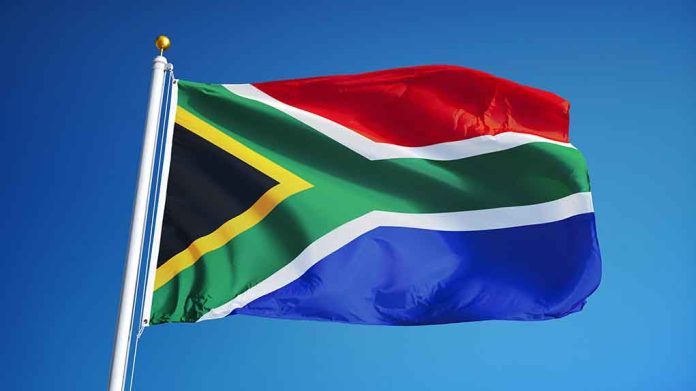
South Africa’s chief rabbi establishes Counter-Terror Task Force to protect Jewish communities from Iranian and jihadi threats, following a recent attempted bomb attack in Cape Town.
Key Takeaways
- South Africa’s chief rabbi, Dr. Warren Goldstein, has formed a Counter-Terror Task Force in response to growing threats from Iran and jihadi groups.
- The task force aims to protect Jewish places of worship, schools, and community centers, with a broader goal of enhancing safety for all South Africans.
- Despite government views, South Africa maintains relatively low levels of antisemitism compared to Western standards.
- Africa has become a hub for jihadi terror, with groups like al-Shabab, Boko Haram, and ISIS increasing threat levels across the continent.
- The task force includes global counter-terrorism experts and follows a model similar to the FBI’s Joint Terrorism Task Forces in the United States.
Responding to Growing Threats
In a decisive move to counter rising security concerns, South Africa’s chief rabbi, Dr. Warren Goldstein, has established a Counter-Terror Task Force. This initiative comes in the wake of a recent attempted bomb attack at a Jewish center in Cape Town, highlighting the urgent need for enhanced protection of Jewish communities in the region. The task force’s primary objective is to safeguard places of worship, educational institutions, and community centers from terror threats, with a particular focus on those emanating from Iran and jihadi groups.
The formation of this specialized unit underscores a broader regional concern about the mounting jihadi activities threatening both Jewish and Christian communities throughout Africa. With the continent increasingly becoming a hub for terrorist organizations such as al-Shabab, Boko Haram, and ISIS, the need for coordinated counter-terrorism efforts has never been more critical.
Global Expertise for Local Protection
The Counter-Terror Task Force brings together an impressive array of global terror experts, including Admiral Mike Hewitt, Dean Haydon, Major General David Tsur, and Andre Pienaar. This assembly of international specialists aims to leverage their collective experience and knowledge to enhance the security infrastructure protecting Jewish communities in South Africa and potentially beyond.
While the immediate focus is on securing the South African Jewish community, the task force’s broader ambition is to improve safety for all South Africans and contribute to global counter-terrorism efforts. This approach mirrors the structure and objectives of the FBI’s Joint Terrorism Task Forces (JTTFs) in the United States, which have proven effective in combating both domestic and international terrorism threats.
South Africa’s Unique Position
Despite the South African government’s controversial stance at the International Court of Justice, which has been criticized for potentially stigmatizing Jews globally, the country maintains a relatively low level of antisemitism compared to Western standards. In 2024, there were 128 recorded antisemitic incidents in South Africa, marking the second-highest count since 1998. However, most of these incidents were verbal or hate mail, with physical attacks remaining rare.
This relatively stable environment has allowed South Africa to remain a comparatively safe space for Jews to practice their religion openly. The establishment of the Counter-Terror Task Force aims to preserve and enhance this status, ensuring that the Jewish community can continue to thrive without fear of targeted violence or persecution.
Learning from Established Models
The newly formed Counter-Terror Task Force in South Africa can draw valuable lessons from established models such as the FBI’s JTTFs. These U.S.-based task forces have a proven track record of success, operating continuously to protect the public from terrorist attacks. With about 200 JTTFs across the United States, involving hundreds of state, local, and federal agencies, they provide a comprehensive network of defense against terrorism.
JTTFs are composed of highly trained investigators, analysts, linguists, and specialists from various law enforcement and intelligence agencies. They are responsible for pursuing leads, gathering evidence, making arrests, providing event security, collecting and sharing intelligence, and responding to threats and incidents. This multi-faceted approach could serve as a blueprint for South Africa’s task force as it develops its operational strategies.
As South Africa’s Counter-Terror Task Force takes shape, its success will likely depend on its ability to adapt global best practices to local conditions, fostering cooperation between various agencies and communities. By doing so, it has the potential to not only protect Jewish communities but also contribute to the overall security landscape of South Africa and the broader African continent.
Sources:
- https://www.dni.gov/index.php/gt2040-home/emerging-dynamics/international-dynamics/the-future-of-terrorism
- https://www.state.gov/terrorism-finance/
- https://www.fbi.gov/investigate/terrorism/joint-terrorism-task-forces
- https://www.foxnews.com/world/task-force-created-africa-counter-terror-fears-from-iran-jihadi-groups










